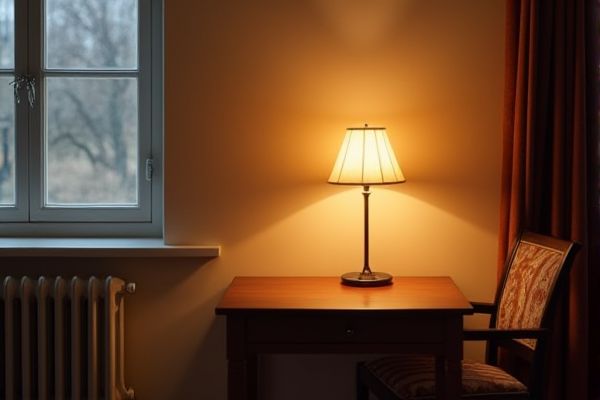
Desk lamps provide focused lighting ideal for tasks and reading, while floor lamps offer ambient illumination to brighten larger spaces and enhance room decor. Discover which lighting solution best suits Your needs by exploring the detailed comparison in the article.
Table of Comparison
| Feature | Desk Lamp | Floor Lamp |
|---|---|---|
| Primary Use | Task lighting for work or study | Ambient or accent lighting for rooms |
| Size | Compact, fits on desks or tables | Tall, stands on the floor |
| Portability | Easy to move and reposition | Less portable, usually stationary |
| Light Direction | Focused and adjustable beam | Wide, diffused light coverage |
| Power Source | Plug-in or USB powered | Plug-in, may have foot switch |
| Design Varieties | Modern, adjustable, classic styles | Torchiere, arc, multi-head styles |
| Ideal Location | Office desk, bedside table | Living room, bedroom corners |
| Price Range | $15 - $100+ | $40 - $200+ |
Introduction: Desk Lamp vs Floor Lamp
Desk lamps provide focused lighting ideal for tasks such as reading, writing, or computer work, making them perfect for your workspace or study area. Floor lamps offer broader ambient lighting suitable for larger rooms, enhancing overall illumination and decorative appeal. Choosing between a desk lamp and a floor lamp depends on your specific lighting needs and room layout to optimize brightness and functionality.
Design and Aesthetics
Desk lamps feature compact, functional designs ideal for focused task lighting, often incorporating adjustable arms and modern styles that fit neatly on workspaces. Floor lamps offer larger, statement-making aesthetics that enhance room ambiance with various shapes and heights, serving as both lighting sources and decorative elements. Choices between the two depend on spatial requirements and desired visual impact, with desk lamps emphasizing practicality and floor lamps contributing more to overall interior design.
Space and Placement Flexibility
Desk lamps offer high space efficiency, ideal for small desks or confined areas, providing focused task lighting without occupying floor space. Floor lamps deliver greater placement flexibility, easily moved to different room spots to enhance ambient or accent lighting in larger spaces. Choosing between the two depends on room size, lighting needs, and available surface versus floor area.
Lighting Coverage and Brightness
A desk lamp provides focused, localized lighting ideal for tasks requiring precision and detail, offering concentrated brightness that reduces eye strain during close-up work. Floor lamps deliver broader lighting coverage suitable for ambient illumination, brightening an entire room or larger area with versatility in light levels and placement. Your choice depends on whether you need targeted task lighting or expansive room illumination to enhance visibility and comfort.
Energy Efficiency
Desk lamps typically consume less energy than floor lamps due to their smaller size and targeted lighting area, making them ideal for task-specific illumination. Many desk lamps utilize LED bulbs, which offer high energy efficiency and longer lifespan, reducing electricity costs over time. Floor lamps often require higher wattage bulbs to light larger spaces, potentially increasing overall energy consumption if not equipped with energy-saving technologies like dimmers or LEDs.
Ideal Use Cases
Desk lamps are ideal for focused tasks such as reading, writing, or detailed work at a workspace, providing direct, adjustable light that minimizes eye strain. Floor lamps suit ambient lighting needs in living rooms, bedrooms, or large areas where indirect light enhances the room's atmosphere. Your choice depends on whether you require concentrated illumination for productivity or softer, wide-reaching light for relaxation and decor.
Cost and Budget Considerations
Desk lamps generally offer a more budget-friendly option with prices ranging from $20 to $100, making them ideal for focused task lighting without a significant investment. Floor lamps typically cost between $50 and $200, providing broader illumination and often serving as a statement piece in room decor. Your choice should reflect both your lighting needs and budget constraints, ensuring cost-effective functionality.
Adjustability and Features
Desk lamps offer superior adjustability with flexible arms, swivel heads, and dimmable brightness, allowing precise control of light direction and intensity for tasks requiring focused illumination. Floor lamps, while generally less adjustable, often feature multiple light sources and height options, making them suitable for ambient lighting and larger room coverage. Advanced models in both categories may include USB charging ports, touch controls, and color temperature adjustments to enhance functionality.
Maintenance and Durability
Desk lamps typically require less maintenance due to their smaller size and simpler design, with components like LED bulbs that last up to 25,000 hours, reducing replacement frequency. Floor lamps, while often sturdier with metal or hardwood constructions, may need more upkeep because of their larger and more complex structures, including tall stands that can become unstable or accumulate dust more easily. Durability depends on materials used; metal floor lamps generally outlast plastic desk lamps, but desk lamps with high-quality components can offer long-lasting performance in compact spaces.
Conclusion: Choosing the Right Lamp
Desk lamps provide focused, adjustable lighting ideal for tasks requiring precision, while floor lamps offer ambient illumination that brightens larger spaces. Your choice depends on the specific lighting needs, room size, and functionality desired. Selecting the right lamp enhances both productivity and ambiance, creating a comfortable environment tailored to your activities.
 homyna.com
homyna.com